-
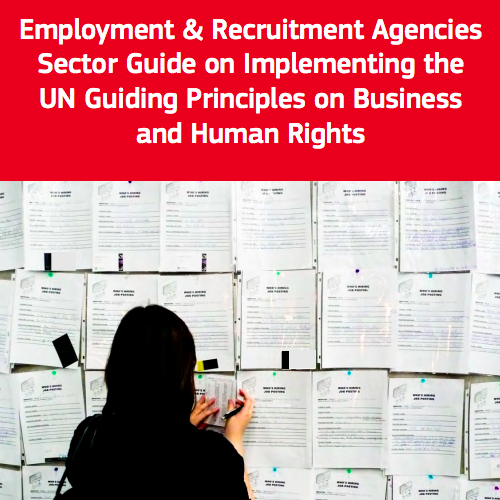 This Guide applies the UN Guiding Principles on Business and Human Rights to the specific context of employment and recruitment agencies. Recognising that each company is different, it is intended to help agencies “translate” respect for human rights into their own systems and company cultures. In December 2011, IHRB and Shift were selected by the European Commission (Directorate-General for Enterprise and Industry) to develop sector-specific guidance on the corporate responsibility to respect human rights, as set out in the UN Guiding Principles on Business and Human Rights.
This Guide applies the UN Guiding Principles on Business and Human Rights to the specific context of employment and recruitment agencies. Recognising that each company is different, it is intended to help agencies “translate” respect for human rights into their own systems and company cultures. In December 2011, IHRB and Shift were selected by the European Commission (Directorate-General for Enterprise and Industry) to develop sector-specific guidance on the corporate responsibility to respect human rights, as set out in the UN Guiding Principles on Business and Human Rights. -
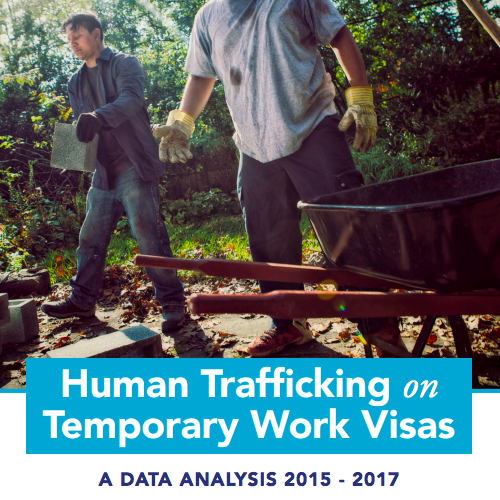 This report highlights the destructive practice of labour trafficking on temporary work visas, how the system is flawed, and the steps needed to fix it. From 2015-2017, Polaris collected data on the US temporary work visa system and identified some 800 victims of human trafficking who held temporary work visas at the time of their abuse.
This report highlights the destructive practice of labour trafficking on temporary work visas, how the system is flawed, and the steps needed to fix it. From 2015-2017, Polaris collected data on the US temporary work visa system and identified some 800 victims of human trafficking who held temporary work visas at the time of their abuse.Credit: Polaris
-
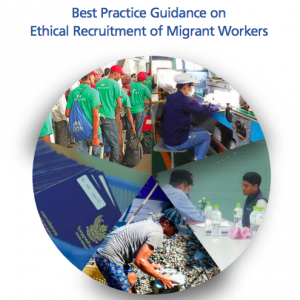 The ICCR is a coalition of faith-based investors. This guidance looks at emerging best practice trends in eight companies from high risk sectors, analysing their developments in corporate ethical recruitment policies and identifying gaps for improvement. The key learning points provided in the guidance can be used as a starting point for businesses to develop their own policies.
The ICCR is a coalition of faith-based investors. This guidance looks at emerging best practice trends in eight companies from high risk sectors, analysing their developments in corporate ethical recruitment policies and identifying gaps for improvement. The key learning points provided in the guidance can be used as a starting point for businesses to develop their own policies.Credit: Interfaith Center on Corporate Responsibility (ICCR)
-
 The Leadership Group for Responsible Recruitment calls for the implementation of the Employer Pays Principle which requires companies to commit to bearing the costs of recruitment. This short guide breaks down six steps companies should take to meet the commitment in practice.
The Leadership Group for Responsible Recruitment calls for the implementation of the Employer Pays Principle which requires companies to commit to bearing the costs of recruitment. This short guide breaks down six steps companies should take to meet the commitment in practice.Credit: Leadership Group for Responsible Recruitment
-
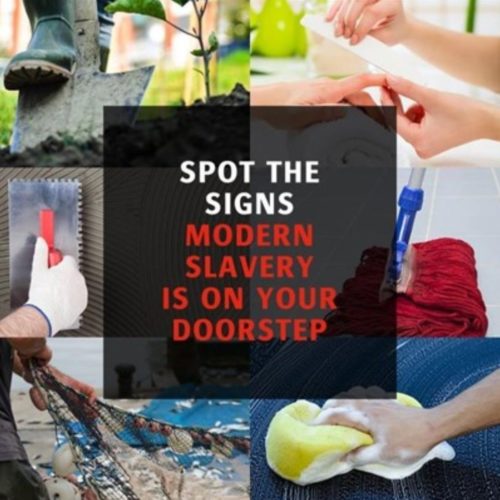 Crimestoppers is an independent charity helping law enforcement to locate criminals and help solve crimes. They have an anonymous 24/7 phone number (0800 555 111) that people can call to pass on information about crime. They are running a campaign to help people identify the signs of modern slavery and give specific information about the hospitality sector. The flyer about spotting the signs is in six languages.
Crimestoppers is an independent charity helping law enforcement to locate criminals and help solve crimes. They have an anonymous 24/7 phone number (0800 555 111) that people can call to pass on information about crime. They are running a campaign to help people identify the signs of modern slavery and give specific information about the hospitality sector. The flyer about spotting the signs is in six languages.Credit: Crimestoppers
-
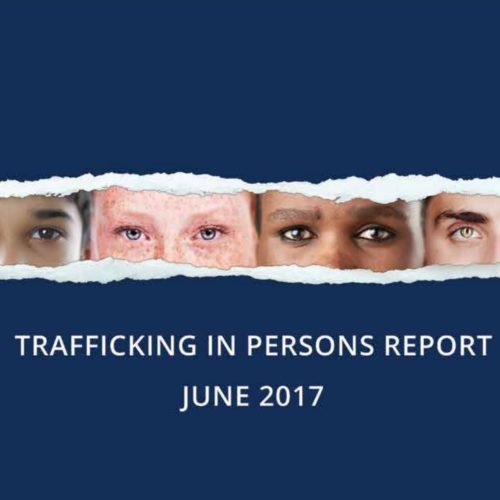 The Trafficking in Persons Report, or TIP Report, is an annual report issued by the U.S. State Department's Office to Monitor and Combat Trafficking in Persons. It provides countrywide statistics on Human Trafficking including definitions, themes and case studies. It ranks governments based on their perceived efforts to acknowledge and combat human trafficking.
The Trafficking in Persons Report, or TIP Report, is an annual report issued by the U.S. State Department's Office to Monitor and Combat Trafficking in Persons. It provides countrywide statistics on Human Trafficking including definitions, themes and case studies. It ranks governments based on their perceived efforts to acknowledge and combat human trafficking.Credit: United States of America Department of State
-
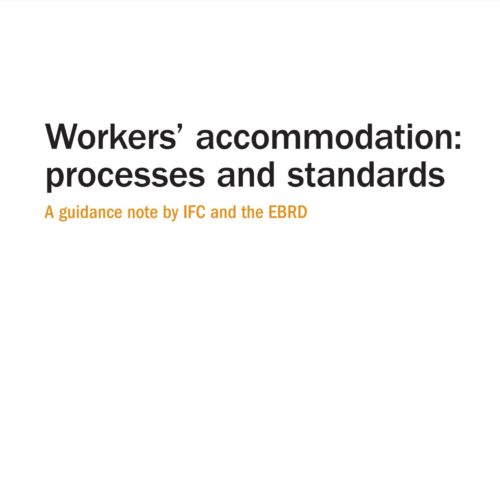 This Guidance Note is written by the EBRD, an international financial institution, and the IFC, a member of the World Bank Group, which creates opportunity for people to escape poverty and improve their lives. It is aimed at providing practical guidance to IFC and EBRD specialists, consultants and clients on the processes and standards that should be applied to the provision of workers’ accommodation in relation to projects funded by IFC or the EBRD. The Guidance Note also provides examples of good practice approaches that businesses have successfully applied in their operations.
This Guidance Note is written by the EBRD, an international financial institution, and the IFC, a member of the World Bank Group, which creates opportunity for people to escape poverty and improve their lives. It is aimed at providing practical guidance to IFC and EBRD specialists, consultants and clients on the processes and standards that should be applied to the provision of workers’ accommodation in relation to projects funded by IFC or the EBRD. The Guidance Note also provides examples of good practice approaches that businesses have successfully applied in their operations.Credit: International Finance Corporation & the European Bank for Reconstruction and Development
-
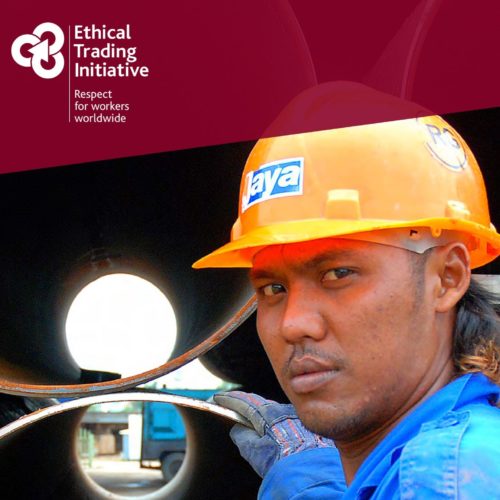 The Ethical Trading Initiative (ETI) is an alliance of companies, trade unions and NGOs that promotes workers' rights around the world. This guide is for companies to help them prevent and manage labour rights risks, and understand why engagement, negotiation and collaboration is key.
The Ethical Trading Initiative (ETI) is an alliance of companies, trade unions and NGOs that promotes workers' rights around the world. This guide is for companies to help them prevent and manage labour rights risks, and understand why engagement, negotiation and collaboration is key.Credit: Ethical Trading Initiative
-
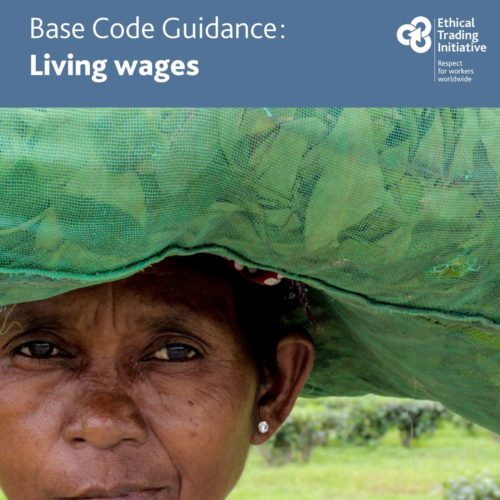 The Ethical Trading Initiative (ETI) is an alliance of companies, trade unions and NGOs that promotes workers' rights around the world. Through this guide, they share what companies can do to create the enabling conditions for the payment of living wages, in line with their commitment to the ETI Base Code. They outline their expectations of ETI members and provide guidance on winning senior executives’ support for living wages. The guidance includes practical steps for developing living wage strategies and collaborating with stakeholders to identify sustainable, scalable solutions. It also covers the vital question of how to offset the cost of increased wages, and includes the experience of ETI members.
The Ethical Trading Initiative (ETI) is an alliance of companies, trade unions and NGOs that promotes workers' rights around the world. Through this guide, they share what companies can do to create the enabling conditions for the payment of living wages, in line with their commitment to the ETI Base Code. They outline their expectations of ETI members and provide guidance on winning senior executives’ support for living wages. The guidance includes practical steps for developing living wage strategies and collaborating with stakeholders to identify sustainable, scalable solutions. It also covers the vital question of how to offset the cost of increased wages, and includes the experience of ETI members.Credit: Ethical Trading Initiative
-
 This leaflet, created by the Heath and Safety Executive (HSE) is aimed at employers who provide work experience opportunities to young people. The HSE is the body responsible for the encouragement, regulation and enforcement of workplace health, safety and welfare, and for research into occupational risks in Great Britain. All HSE publications, whether priced or non-priced, are subject to Crown Copyright. The Government encourages the re-use of public information. Crown copyrighted material may be used and re-used free of charge in any format or medium, subject to the following conditions: An acknowledgement to the source of the Information must be provided by including the following attribution statement and hyperlink: 'Contains public sector information published by the Health and Safety Executive and licensed under the Open Government Licence v1.0'. www.nationalarchives.gov.uk/doc/open-government-licence/ '
This leaflet, created by the Heath and Safety Executive (HSE) is aimed at employers who provide work experience opportunities to young people. The HSE is the body responsible for the encouragement, regulation and enforcement of workplace health, safety and welfare, and for research into occupational risks in Great Britain. All HSE publications, whether priced or non-priced, are subject to Crown Copyright. The Government encourages the re-use of public information. Crown copyrighted material may be used and re-used free of charge in any format or medium, subject to the following conditions: An acknowledgement to the source of the Information must be provided by including the following attribution statement and hyperlink: 'Contains public sector information published by the Health and Safety Executive and licensed under the Open Government Licence v1.0'. www.nationalarchives.gov.uk/doc/open-government-licence/ 'Credit: Health and Safety Executive
-
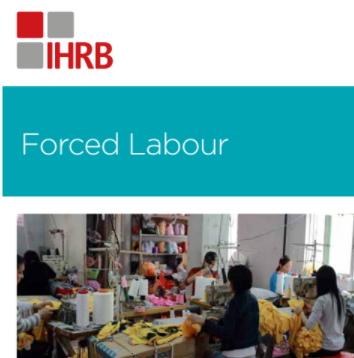 This is a briefing produced by the think tank IHRB on forced labour, its indicators and which industries are particularly affected. It covers how company practice can leave workers vulnerable to modern slavery and lists key standards that work to protect workers against the type of exploitation.
This is a briefing produced by the think tank IHRB on forced labour, its indicators and which industries are particularly affected. It covers how company practice can leave workers vulnerable to modern slavery and lists key standards that work to protect workers against the type of exploitation.Credit: Institute for Human Rights and Business (IHRB)
-
 This is a briefing produced by the think tank IHRB on tackling the exploitative recruiter practice of charging recruitment fees. It outlines the harms of recruitment fees for workers and highlights how businesses can support migrant workers through legal compliance and transparency.
This is a briefing produced by the think tank IHRB on tackling the exploitative recruiter practice of charging recruitment fees. It outlines the harms of recruitment fees for workers and highlights how businesses can support migrant workers through legal compliance and transparency.Credit: Institute for Human Rights and Business (IHRB)
-
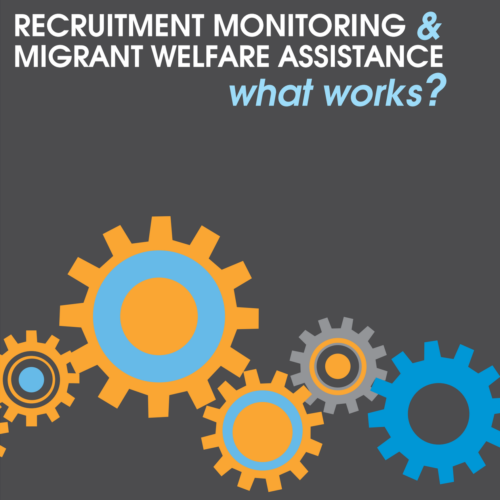 The IOM is a UN organisation providing advice and services to governments and migrants. This report focuses on the migrant welfare assistance currently offered to members of the Colombo Process group in countries of destination. It reviews provisions currently in place to prevent abusive recruitment practices and includes a proposed framework for measuring the effectiveness of recruitment monitoring.
The IOM is a UN organisation providing advice and services to governments and migrants. This report focuses on the migrant welfare assistance currently offered to members of the Colombo Process group in countries of destination. It reviews provisions currently in place to prevent abusive recruitment practices and includes a proposed framework for measuring the effectiveness of recruitment monitoring.Credit: International Organisation for Migration (IOM)
-
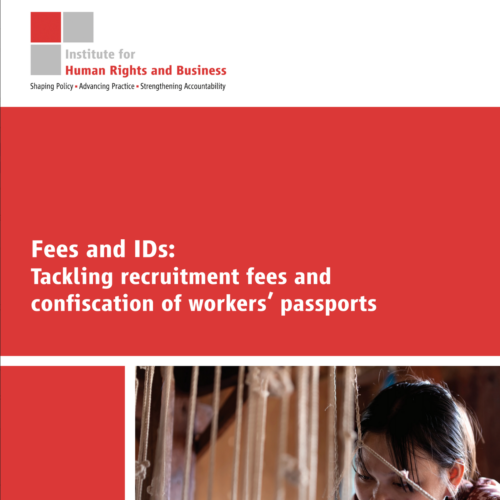 This is a guide produced by the think tank IHRB for tackling the exploitative recruiter practices of charging recruitment fees and confiscation of workers’ practices. The report gives background information regarding the extent of these practices, the current national and international legal frameworks, the business response to the problem and challenges to businesses, and ends with recommendations to businesses.
This is a guide produced by the think tank IHRB for tackling the exploitative recruiter practices of charging recruitment fees and confiscation of workers’ practices. The report gives background information regarding the extent of these practices, the current national and international legal frameworks, the business response to the problem and challenges to businesses, and ends with recommendations to businesses.Credit: Institute for Human Rights and Business (IHRB)
-
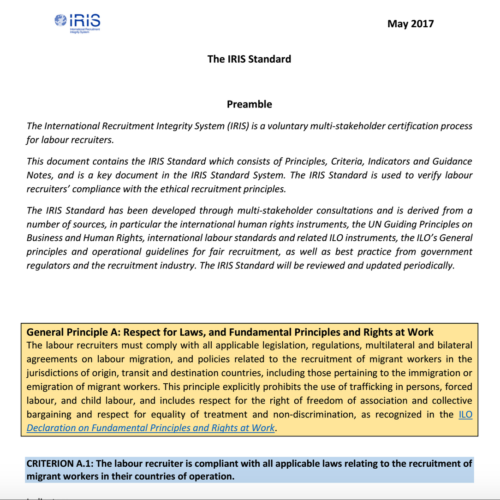 The International Recruitment Integrity System is a voluntary, multi-stakeholder certification system seeking to implement ethical recruitment standards. The Code of Conduct was established by IRIS as part of these efforts. There are 2 General Principles: Respect for Laws, and Fundamental Principles and Rights at Work Respect for Ethical and Professional Conduct It includes 5 Principles:
The International Recruitment Integrity System is a voluntary, multi-stakeholder certification system seeking to implement ethical recruitment standards. The Code of Conduct was established by IRIS as part of these efforts. There are 2 General Principles: Respect for Laws, and Fundamental Principles and Rights at Work Respect for Ethical and Professional Conduct It includes 5 Principles:- prohibition of recruitment fees to jobseekers
- respect for freedom of movement
- respect for transparency of terms and conditions of employment
- respect for confidentiality and data protection
- respect for access to remedy
Credit: International Recruitment Integrity System (IRIS)
-
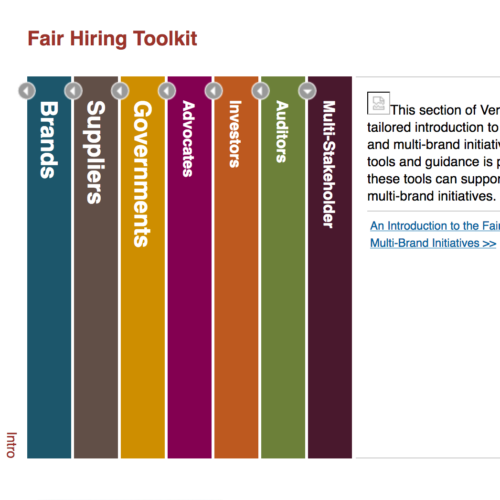 The Fair Hiring Toolkit is a resource which addresses fair hiring practice and responsible recruitment of migrant workers in global supply chains. It focuses on all levels of an organisation to tailor tools and advice appropriately and is a step-by-step process of how to implement trafficking-free supply chains. This includes providing a Framework for Action for brands and suppliers, and supplying guidance for governments, advocates, investors, auditors and other stakeholders. The Frameworks offer advice on: - Improving Codes of Conduct - Raising awareness and building capacity - Strengthening assessments and social audits - Taking corrective action & developing systems improvement plans - Reporting and transparency - Engagement with other actors - Public policy
The Fair Hiring Toolkit is a resource which addresses fair hiring practice and responsible recruitment of migrant workers in global supply chains. It focuses on all levels of an organisation to tailor tools and advice appropriately and is a step-by-step process of how to implement trafficking-free supply chains. This includes providing a Framework for Action for brands and suppliers, and supplying guidance for governments, advocates, investors, auditors and other stakeholders. The Frameworks offer advice on: - Improving Codes of Conduct - Raising awareness and building capacity - Strengthening assessments and social audits - Taking corrective action & developing systems improvement plans - Reporting and transparency - Engagement with other actors - Public policyCredit: Verite

